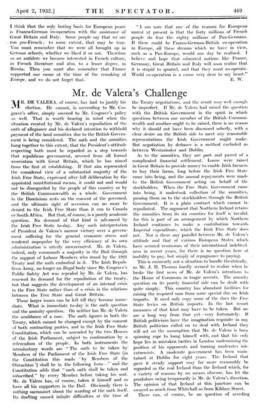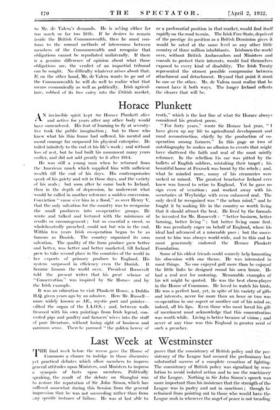Mr. de Valet a's Challenge
ATR. DE VALERA, of course, has had to justify his -1-7-1- election. He cannot, in succeeding to Mr. Cos, grave's office, simply succeed to Mr. Cosgravc's policy as *ell. That is worth bearing in mind when the situation created by Mr. de Valera's repudiation of the oath of allegiance and his declared intention to withhold payment of the land annuities due to the British Govern- Anent is being considered. The oath and the annuities hang together to this extent, that the President's attitude respecting both must be regarded as a step towards that republican government, severed from all formal association with Great Britain, which he has aimed from the first at establishing. If that aim represented the considered view of a substantial majority of the Irish Free State, expressed after full deliberation by the appointed constitutional means, it could not and would not be disregarded by the people of this country or by the British Commonwealth as a whole. Government in the Dominions rests on the consent of the governed, and the ultimate right of secession can no more be denied to the Irish Free State than it can to Canada or South Africa. But that, of course, is a purely academic question. No demand of that kind is advanced by the Mali Free State to-day. Any such interpretation of President de Valera's narrow victory over a govern- ment suffering for the general economic stress and rendered unpopular by the very efficiency of its own administration is utterly unwarranted. Mr. de Valera,
• indeed, only commands a majority in the Dail through the support of Labour Members who stand by the 1921 Treaty and the oath embodied in it. The Irish Repub- lican Army, no longer an illegal body since Mr. Cosgrave's Public Safety Act was repealed by Mr. de Valera, has renewed its demand for the repudiation of the treaty, but that suggests the development of an internal crisis in the Free State rather than of a crisis in the relations between the Free State and Great Britain.
Those larger issues can be left till they become imme- diate. What is immediate to-day is the oath question and the annuity question. On neither has Mr. de Valera the semblance of a case. The oath figures in both the Treaty, which cannot be changed except by the consent of both contracting parties, and in the Irish Free State Constitution, which can be amended by the two Houses of the Irish Parliament, subject to confirmation by a referendum of the people. In both instruments the introductory words are " The oath to be taken by Members of the Parliament of the Irish Free State [in the Constitution this reads ' by Members of the Oireachtas 1 shall be in the following form—" and the Constitution adds that " such oath shall he taken and subscribed " by every Member before taking his seat. Mr. de Valera has, of course, taken it -himself and so have all his supporters in the Dail. Obviously there is nothing sacrosanct about the wording of the oath itself. Its drafting caused infinite difficulties at the time of
the Treaty negotiations, and the result may well enough be imperfect. If Mr. de Valera had raised the question with the British Govenunent in the spirit in which questions between one member of the British Common- wealth and another ought to be raised, there is no reason why it should not have been discussed soberly, with clear desire on the British side to meet. any reasonable representations the Irish Government might make. But negotiation by defiance is a method excluded as between Westminster and Dublin.
As to the annuities, they are part and parcel of a complicated financial settlement. Loans were raised in Great Britain to provide money to enable Irish farmers to buy their farms, long before the Irish Free State came into being, and the ammal repayments were made to the British Government acting on behalf of the stockholders. When the Free State Government calme into being, it undertook collection of the annuities, passing them on to the stockholders through the British Government. It is a plain contract which cannot hi' repudiated. The argument that Northern Ireland retains the annuities from its six counties for itself is invalid, for this is part of an arrangement by which Northern Ireland continues to make a contribution towards Imperial expenditure, which the Irish Free State does not. Nor is there any parallel between Mr. de Valero's attitude and that of various European States which have secured remissions of their international indebted- ness in recent years, for there is no question here of inability to pay, but simply of repugnance to paying.
This is eminently not a situation to handle theatrically, as Mr. J. II. Thomas hardly seemed to realize when lw broke the first news of Mr. de Valera's intentions to the House of Commons in tragic accents. The annuity question on its purely financial side can be dealt with quite simply. This country has abundant facilities for raising the required sum from some special due on Irish imports. It need only copy some of the dues the Free State levies on British imports. Its the last resort measures of that kind may have to be taken. But we are a long way from that yet—very fortunately. It British politicians have the imagination requisite in any British politician called on to deal with Ireland they will act on the assumption that Mr. de Valera is busy spinning rope to hang himself with, and that his only hope lies in mistaken tactics in London undermining the position of his opponents and turning moderates irate extremists. A moderate government has been main- tained at Dublin for eight years. The Ireland that gave it steady support may far more reasonably be regarded as the real Ireland than the Ireland which, for a variety of reasons by no means obscure, has let the pendulum swing temporarily in Mr. dc Valera's direction, The opinion of that Ireland at this juncture can be swayed as much from Whitehall as from Kildare Street.
There can, of course, be no question of acceding
to Mr. de Valera's demands. He is asking either far too much or fir too little. If he desires to remain inside the British Commonwealth, then he must con- form to the normal. methods of • intercourse between members of the Commonwealth and recognize that obligations cannot he repudiated unilaterally. If there is a genuine difference of opinion about what those obligations are, the verdict of an impartial tribunal can be sought. No difficulty whatever arises about that. If, on the other hand, Mr. de Valera wants to go out of the Commonwealth he will do well to realize what that means economically as well as politically. Irish agricul- ture, robbed of its free entry into the Dritish market, or a preferential position in that market, would find itself rapidly on the road to ruin. The Irish Free State, deprived of the prestige its position as a British Dominion gives it would be rated at the same level as any other little country of three million inhabitants. Irishmen the world over, without British Ambassadors and Ministers and consuls to protect their interests, would find themselves exposed to every kind of disability: The Irish Treaty. represented the utmost possible compromise between attachment and detachment. Beyond that-point must be one or the other.. Mr. de Valera must realize. that he cannot have it both ways. The longer Ireland 'reflects the dearer that will be.

































 Previous page
Previous page